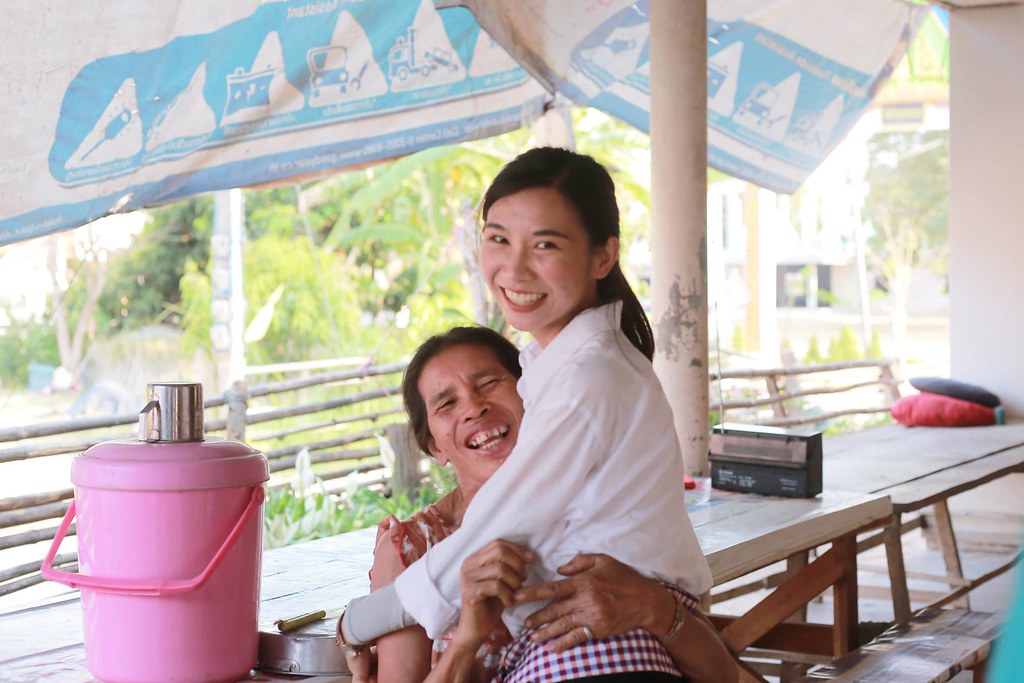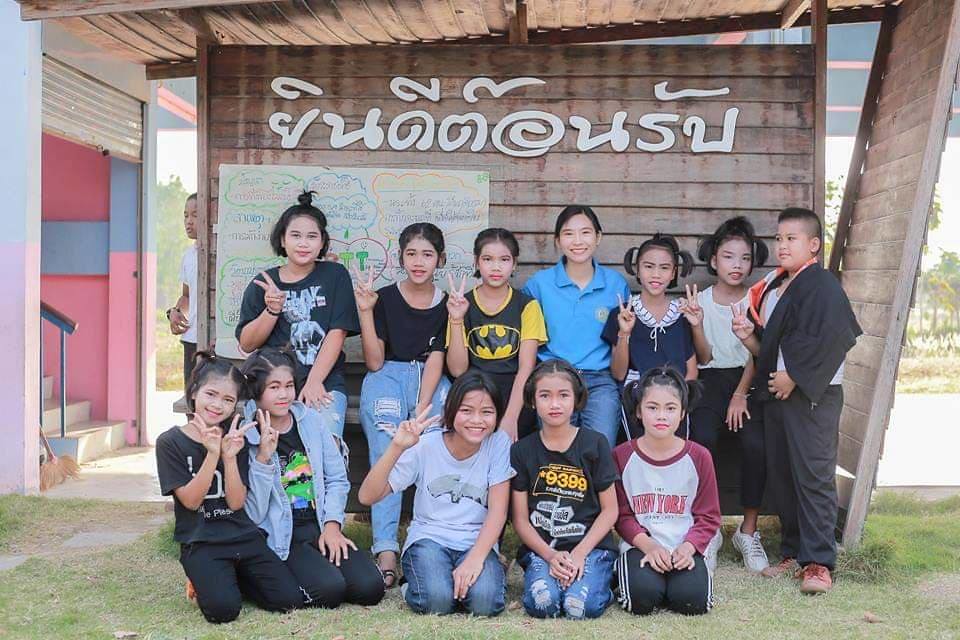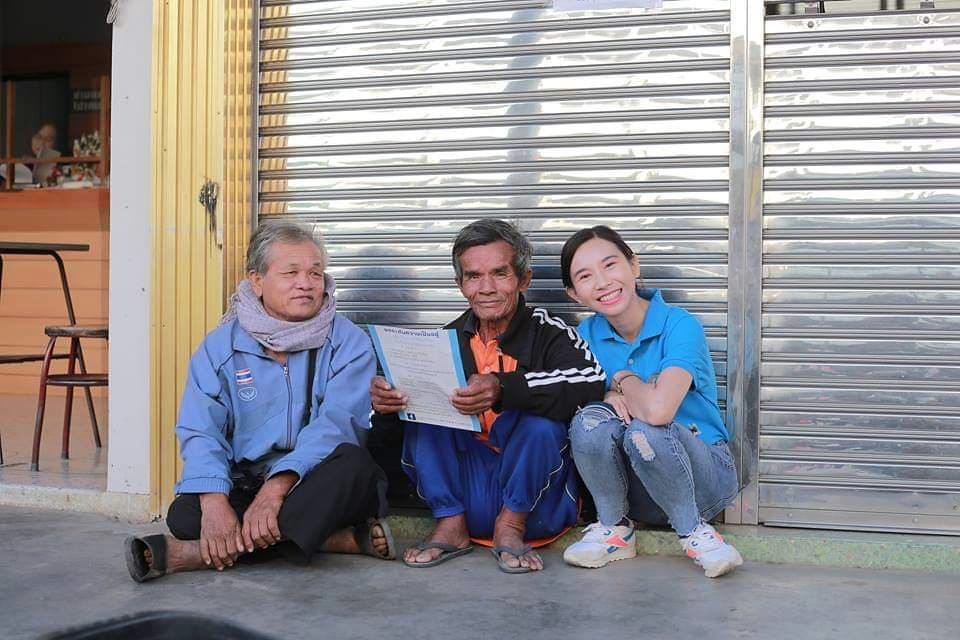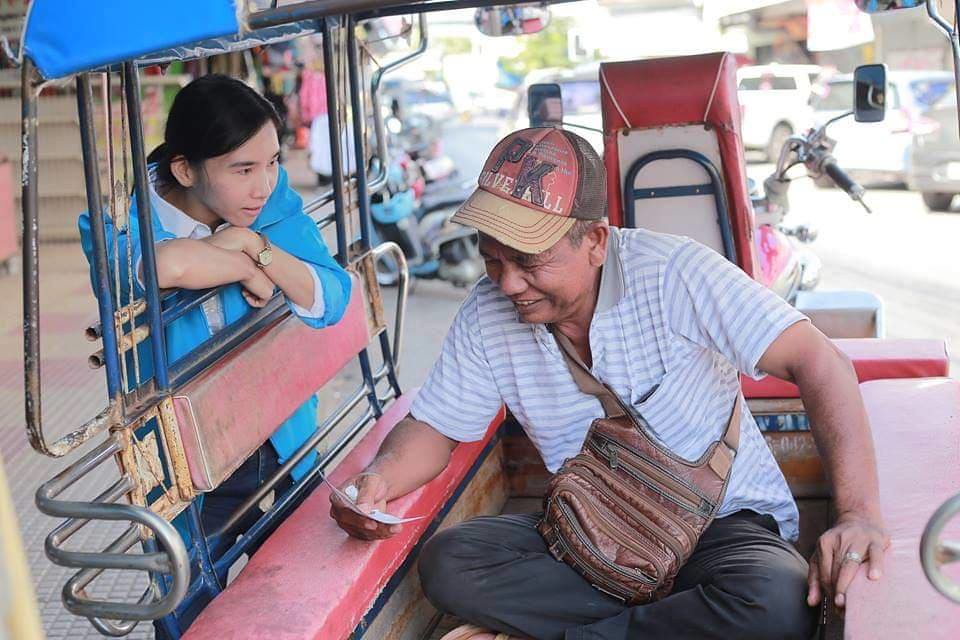Prachatai interviews Nattika Loweera, a Democrat MP candidate in Chaiyaphum's Constituency 1. The journalist-turned-politician talks about the challenges of campaigning in a Pheu Thai stronghold, her role as a ‘New Dem’ in a conservative Democrat Party, as a new generation of woman politician in context of political transformation, the trending child welfare policy in Chaiyuphum, as well as her perspective on an amnesty for political prisoners and political refugees, amending laws that obstruct rights and freedom, and people’s participation in the Cyber Security Act, Computer Crime Act, Public Assembly Act, and a solution to Article 112.

You used to be a journalist. Why did you decide to go into politics?
N: Being a journalist makes you see the truth - not just a point of view, but many points of view. I found political, economic, and social inequality [when I worked as a journalist]. The power of journalism can help solving problems to a certain extent. But politics is about equal and fair distribution among the people.
First, I looked at the problem from my perspective as a journalist. Second, politics is about the distribution of benefits. Third, the inspiration of my generation, which manifests in every party, leads me to realize that I am a part of a society which faces both old and new challenges. Since I have the opportunity as society opens the door for the new generation to participate, I decided to work in politics. I am the new generation and a representative of it, a group that will live for 50-60 years from now, so I think we should participate in public administration.

In your opinion, what are old problems and what are new problems?
Old problems are about inequality in all aspects, economic, social, and political. A small few have a monopoly on these powers. New problems are the ones we face which result from the old problems, such as the lack of political participation since the military coup, the Constitution, the National Strategy - take a side note that society does not oppose the National Strategy, but we need to discuss about participation, reasons for it, and its tendency. So the old problems have kept causing new problems for us people who have to live on in this society. The enactment of new laws that lack participation [from the people] such as the Cyber Security Act; is that compatible with the context? How much have people participated in it? This is political inequality as well as inequality in terms of rights and freedom.
How did you come into the political field?
N: The opportunity came when the government announced the election. Having restrictions on their activities unlocked, political parties started recruiting candidates. As the law says that an MP must be a member of a political party, I discussed with my family my interest in politics. Then I decided that I was going to join a political party to be an MP. So, this is the pivotal moment.
The country was going to have an election, it wasn’t only me running for MP. Other political parties such as Future Forward Party also had a motorcycle taxi running as an MP. This opens a window for people to participate, not only in terms of who will run this country, but also in terms of policy discussions.
How do the other party members see you, as someone from the new generation? Where do you stand in the Democrat Party, which is often seen as conservative?
N: Young Democrats have always been there, and the New Dems are an extension of the group. We root people in democracy and the New Dems are a group that can run [as a candidate], can learn, and can propose policies. Party members do not see the New Dems as kids, but as colleagues who work for the party, as many policies were proposed by the New Dems. I also would like to ask people in society who see the Democrat Party as conservative as to why they see it that way, because the Democrats also support LGBT rights, discuss gender and support women’s rights. I think the Democrat Party, that even I used to see [as conservative], is changing when I joined it and see how it works.
What is the difference between Young Democrats and New Dem?
N: The Young Democrats are the kid students in a network that we built for them to participate with the Democrat Party. Activities and seminars are being held. New Dems can be seen as the seniors who come from all walks of life - they are no longer students. One can say that they are 25-35 years old, and they also connect with society, not only the schools.
Can we say that Young Democrats are like interns, but New Dem are people who are really working?
N: Yes, and some of the New Dems are not Young Democrats. They are diverse in terms of age, occupation, and personality.
When New Dem propose policies, was there anything that was rejected by the party?
N: The party did not reject the policies we proposed. What I’ve seen is that they did not promote these policies to become major policies. They pay more attention to economic issues. The party has to prioritize, and these are more concrete. When we present them, the people feel like their lives will get better. As for issues of rights and freedoms, I have to say that some people think issues of how they will make a living are more important. Some parties propose that they will pay an elderly welfare allowance of 5000 baht per month, and people like it, but they don’t think about their rights and their freedoms. They just want to survive month by month. We have to accept that. But at least, even if the party does not really present policies about rights and freedoms, we have these policies, and the New Dems are the group who is pushing for these policies. The party already has academics and economists working on economic issues.
Abhisit said on a debate show that he won’t be forming a government with Prayut, but he may form a government with the Palang Pracharat Party if PPRP accepts his conditions. Do you think the New Dems will be able to work with the PPRP?
N: The Democrat Party’s principle is for democracy and for the people. Will the PPRP be able to accept our conditions if we ask them to change and work under democratic principles? Will our intentions be the same if we are to work together?
How do people view you as a female MP candidate running in this election?
N: Politics is a male-dominated field and there are a lot of male politicians. There are a lot of men in parliament, and a lot of male candidates. As a woman running in this election, people praise me for being a strong woman. A woman running as an MP candidate is seen as brave. It also makes women in the community feel that they are capable of determining where the country is going. They see their own strength. Because of this, when I go to meet people, they say “you’re tiny, but you’re so strong.”
When you campaign, do you feel that people treat you differently from how they treat a male candidate?
N: They don’t treat me differently. This is the first time I’ve run in an election, but when people come to welcome me, I tell them “you don’t need to do this. I don’t mind” or something like that, but that’s not what it’s about. This is how they used to treat MP candidates. They will keep doing that. Gender doesn’t make them do anything different.
When you campaign, do you get any nonsensical comments, such as about how you dress?
N: When we’re in a field where men are influential, and suddenly there’s a woman, people say “I’m choosing the girl. She’s a fighter.” Society sees my running in the election as courage, so they don’t give me any nonsense. When I meet people, I don’t give them nonsense either. I present our policies, and our democratic ideals, focusing on equal rights, freedom, and unity. Gender is about equality. Because this is my principle, this is how I present myself, and people don’t use my gender to attack me. I show them that there are problems in the country, not just saying that I’m a woman or anything like that.
What are the roles of women and LGBT in the communities?
N: I see a lot of women who are community leaders. They are leaders of women’s groups and Tambon Administrative Organizations. Leaders of elderly groups are women. A woman’s personality is gentle, so in groups like the elderly who need to be cared for, we see female leaders who find them jobs, take care of them, entertain them. As for men, we see them in every group, like village chiefs or something like that, but I think that, when it comes to gender, goodness concerns the person, not their gender. I see good village heads too. As for LGBT, we need to think of them as people. Gender is not relevant.
We know that the Northeastern provinces are Pheu Thai and Puea Chart strongholds. What are the challenges you face while campaigning?
N: The challenge is the people’s attitude. I see that this is Pheu Thai’s area, and if the people don’t like me, I have to accept it. If I can talk to them, then I have to change their attitude. I have to tell them we have policies that will solve their problems, and as a candidate, I want to represent everyone. Our policies aren’t for a specific group, or solve the problems of people who support this or that party, but are policies that improve the quality of life for everyone, and I don’t attack anyone. I make sure they see that I take this seriously.
Did anyone curse at you while you are campaigning?
N: I think there is less conflict. On social media, you think it’s really bad, with hate speech and such, but in the field, it’s not that bad. The people I hire campaign cars from, at first they said that they didn’t want to go into the community, that they’re scared. They won’t take the job if I hire only one car. They said you need two, but then there is a cost, so I asked them why. They told me that people used to throw things at them, but when I go, there’s nothing. People welcome me. If I knock on someone’s door and they don’t like me, then they don’t talk to me, but there’s no violence and no one is rude.
When Abhisit came to Chaiyaphum, people came to greet him. There is always someone. But people with different ideologies, they came too. Speaking as a political scientist, not as a candidate, isn’t it something to be happy about that there is less conflict?
You said that there is less conflict in the area. What do you think if political prisoners and political exiles will be pardoned in the future?
N: Conflict decreases when we all put the country’s benefit first. Adversity doesn’t take sides. When we present a way out, and our intention, we show that we see the problems too, and we want to fix them. When we do this, many groups see that we don’t want to create conflict, and it matches my intention.
I agree with pardons in the cases of people who were charged for expressing their opinions. They should be pardoned so we can work on reconciliation. As for political exiles, we have to look at the details of their cases.
When you campaign, which of your policies in particular did people like?
N: The particular favourite is the child welfare policy. This policy is under attack by some groups who think that it will encourage people to have children. Under the Child Protection Act, a 600 baht per month child allowance will be given, but when the parents register the birth, they have to show a financial statement. If they have the income to take care of the child, they will not get the allowance.
I explained to parents that this is a child’s right, not the parents’. A child has the right to be taken care of. The policy should move towards universal coverage, and the allowance should increase to 1,000 baht per month until 8 years of age. A childbirth allowance will get 5,000 baht, and from 0-8 years old is the period of a child’s development that requires good care. So, in taking care of our people, it should be for everybody, not just someone who has a poor financial statement. It’s about the children. They’re born, is it their fault? Why not give them an allowance? When I explained this to parents, they said yes.
Was there any policy that is questioned by voters? How do you deal with this challenge?
N: They question the policy about conscription. They said, what about national security? If there is a flood or a fire, it was the soldiers who came to help. I have to explain the policy’s objective to them. It’s like how they don’t get our childcare policy. They said it will make people want to have more children. In this case, they think we want to reduce the size of the army, and then the country will not be secure, so we have to explain to them.
First, we want to see changes in the army. We want to see fewer soldiers being used as servants. We want to see that we have capable soldiers, and workers can go to work. We have to be clear about what our policies are for. If we aren’t clear, then people will question and attack us. The power dynamic is something that is on a structural level, but the people don’t see it that way.
Do you think Chaiyaphum is different from other Northeastern provinces? What are the characteristics that stand out about campaigning in Chaiyaphum?
N: Chaiyaphum has candidates who are from a younger generation, and not just me. There is another candidate who is a lawyer. He is a rural lawyer (can I say this?) but I think he is part of the new generation. I think he is fair and straightforward, and he takes this seriously. This is something that stands out.
We’re competing with political parties who have always won in this area, and there are several competing political families. We can win, but we need to have interesting options, not just being the same as everyone else. In other constituencies or other provinces, if it’s all the same families, then the results won’t change. The results would be predictable, but Chaiyaphum has new candidates, so I think there is fluctuation. The younger generation doesn’t look at the parties. They want someone new. This is different from other areas. I saw someone’s post which said that in their area, it’s all the same candidates. If Chaiyaphum is like that, then we know how this will end.
Has Pheu Thai always win in Chaiyaphum?
N: There are two parties: Pheu Thai and Bhumjaithai. These are the two political families who have always been competing. It’s been a long time since the Democrats had a Chaiyaphum MP, I think the last time was when I was born, so it’s hard to compete.
What are your campaigning strategy?
N: I’m a first-time candidate, so people need to see me in person. I want them to see me as much as possible, and being able to talk to them gives me an opportunity to exchange problems and solutions. Speeches are necessary, but they don’t know me, so I need a way to make sure they know me. At first I think that social media will help, but only 20% of my area is urban. The other 80% is agricultural, so I also have to focus on offline work.

Do they not use smartphones at all?
N: No. They don’t know how. When I do fieldwork, I only meet the elderly who are taking care of their grandchildren. Only 20-30% of voters in my area are working people, and for this group, I need to use social media, but looking at the ratio, I can’t neglect offline work. I can’t campaign the way they do it in Bangkok. I have to be part of their society. I have to go to religious events, community events.
When you campaign, is there any slogan that people like?
N: When I got no.12, our campaign made the slogans “Let’s think. Let’s try. Vote No.12” “Choose solutions, choose Nattika.” And since it’s no.12, we also said “vote for me, you will get a dozen”. During our political rallies, we walk as a group and say: “See? Vote for me you will get a dozen.” We campaign by putting smiles on people’s faces, focusing on solutions, not hate mongering.
We may have seen the speeches of various political parties from social media with likes for ranting, something catchy that feels right. But yesterday I just joined a debate, and someone from the other party gave a speech just like on social media or a public stage in Bangkok, but the atmosphere outside Bangkok is different. The locals do not like it, do not listen to it. They are sick of it and feel moody. They do not want to hear about hatred, and when I said “hey, we will solve the problem,” they gave me a big round of applause.
Do you think voters want to know what you can do for them, rather than about abstract concepts and criticism of other people?
N: Yes. This is what it’s like, or Palang Pracharat wouldn’t be getting votes from people who have social welfare cards. This is what they want. You don’t need to say to them that you don’t want this person or that person. Making a living is the most important thing for them.
As a new generation of politicians, how do you view Thai politics during the transitional period? Where do you think we are going?
N: While we’re in the transitional period, society might be a bit frustrated with all the problems. First are structural issues, such as the Constitution and the source of senators. This will stay with us for many years. The national strategy is a long-term political issue and we have to be cautious. I do think about how I could deal with these issues if I get elected, how do I make sure that the people have their rights and freedoms and are able to participate as much as they can under the existing laws.
As for social changes, I think it’s changing for the better. The younger generation are now paying attention to politics, and they see that their rights and freedoms are important. I’m also an English teacher, and a fifth grade student I teach, who can’t even vote yet, asked me what I’m going to do if I become an MP. This is my student’s question, not his parents’. Older people see me and say I’m trying to do something I can’t. So I see that the society is changing. Children don’t think that it’s worth anything if you pay them 100 baht to listen to you or to vote for you. That amount of money, they said that that’s just enough for them to buy items in video games. The younger generation are now forming their own political views. Even if it’s not quick, change takes time. If you don’t want it to take time, then you need reform or a revolution.

You said that, if you are elected, you want to make sure people are free and are able to participate in politics as much as they can under the law. How do you view legislation like Article 112, the Cyber Security Act, the Computer Crime Act, and the Public Assembly Act, which are criticized for being tools used to disrupt freedom of expression?
N: The Cyber Security Act, the Computer Crime Act, and the Public Assembly Act need to be amended in a process in which the people can take part. Any legislation that goes against the principle of rights and freedom of expression, if the legislation gives the state power to look through personal information, or expression, for the purpose of charging people on security cases, it needs to be changed.
Article 112 is related to the monarch, and society has different opinions, so every party and every sector need to come together to find a way out for the constitutional monarch to exist. What is the appropriate guarantee we can give the people that they will have their rights and freedoms, that won’t lead to conflict and violence?
Who is your main group of supporters? How do younger people see you?
N: The younger generation likes it that someone their own age is speaking, and the older generation thinks I’m an interesting option. They think I’m young, but I said no. I’m a member of society, and I have to right to take part in finding solutions to social problems. They think that this is the generation that is most suited to taking care of the country. I think my supporters are from every group, and I have an advantage in that I can communicate with younger people.

Since 2007, Prachatai English has been covering underreported issues in Thailand, especially about democratization and human rights, despite the risk and pressure from the law and the authorities. However, with only 2 full-time reporters and increasing annual operating costs, keeping our work going is a challenge. Your support will ensure we stay a professional media source and be able to expand our team to meet the challenges and deliver timely and in-depth reporting.
• Simple steps to support Prachatai English
1. Bank transfer to account “โครงการหนังสือพิมพ์อินเทอร์เน็ต ประชาไท” or “Prachatai Online Newspaper” 091-0-21689-4, Krungthai Bank
2. Or, Transfer money via Paypal, to e-mail address: [email protected], please leave a comment on the transaction as “For Prachatai English”
